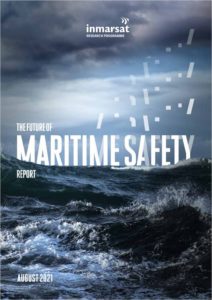New Inmarsat report analyses three years of global maritime distress call data to focus minds on true areas for concern and develop a vision for shipping’s future safety
05 August 2021 – Inmarsat, the world leader in global, mobile satellite communications, has published a new report based on an exclusive analysis of Global Maritime Distress and Safety Services alerts from ships.

Drawing on distress calls sent free at the point of use via the Inmarsat network from vessels worldwide between 2018 and 2020, The Future of Maritime Safety report is published by the Inmarsat Research Programme and has been written by the team at Intent Communications.
“We believe that the creation of an online anonymised data lake of safety information will allow us to identify weak spots and solutions, allocate resources and measure progress towards enhanced safety,” said Peter Broadhurst, Senior Vice President of Safety & Security, Inmarsat Maritime. “Where safety is concerned, data should be shared to create a level playing field for the entire industry.”
The new report also includes significant contributions from Kitack Lim, Secretary General of the International Maritime Organization; Guy Platten, Secretary General, International Chamber of Shipping; Ashok Srinivasan, Manager, Maritime Safety and Security, BIMCO; Kuba Szymanski, Secretary General, Intermanager; and Stuart Edmonston, Director, Loss Prevention, UK P&I Club.
 With the commercial vessel fleet growing by 4.1 per cent in 2019, the report logs 834 distress calls made by Inmarsat GMDSS service users in 2020, compared to 761 in the previous year. In capturing the broadly stable relationship between ships in service and distress call numbers, the report nonetheless highlights specific areas for attention.
With the commercial vessel fleet growing by 4.1 per cent in 2019, the report logs 834 distress calls made by Inmarsat GMDSS service users in 2020, compared to 761 in the previous year. In capturing the broadly stable relationship between ships in service and distress call numbers, the report nonetheless highlights specific areas for attention.
Detailed analysis during the three years shows tankers overtaking fishing vessels to generate the highest number of GMDSS alerts (122 calls in 2020). The high frequency of alerts from coastal waters is interpreted as relating to the operation of older tonnage. Alerts from deep sea tankers are relatively scarce, where charterers require higher standards and younger tonnage is deployed. Fishing distress calls remain frequent, indicating that there is still a lot of work to do in this sector to raise overall safety for fishers and fishing vessels under individual flag state control.
The number of distress calls from bulk carriers and container ships remained largely consistent over the period, although the former witnessed a distinct cluster in the Yellow Sea between China, North Korea and South Korea, while the latter saw a spike in East Asia as Covid-19 unfolded in 2020.
“This report establishes significant trends that merit close scrutiny by all stakeholders and offers a powerful example of the potential for analytics and new technology to provide the basis for a data-driven and more proactive safety,” Broadhurst continued. “Today, a ship’s captain can often be seen as a single point of failure. This is in stark contrast to the ‘Swiss-cheese’ model of risk maritime regulators now accept, and the goal-based and proactive approach that puts rapidly evolving technology at the heart of better supporting the safety of life at sea.”
The new report The Future Of Maritime Safety can be downloaded here.
Contacts
Media Enquiries:
Jonathan Sinnatt/Matthew Knowles
Corporate Communications
Tel: +44 (0)20 7728 1518/1355
press@inmarsat.com
Debbi Bonner
Managing Director, JLA Media Ltd
+31 (0)652 630122
debbi.bonner@j-l-a.com
About Inmarsat
Inmarsat is the world leader in global, mobile satellite communications. It owns and operates the world’s most diverse global portfolio of mobile telecommunications satellite networks, and holds a multi-layered, global spectrum portfolio, covering L-band, Ka-band and S-band, enabling unparalleled breadth and diversity in the solutions it provides. Inmarsat’s long-established global distribution network includes not only the world’s leading channel partners but also its own strong direct retail capabilities, enabling end to end customer service assurance.
The company has an unrivalled track record of operating the world’s most reliable global mobile satellite telecommunications networks, sustaining business and mission critical safety & operational applications for more than 40 years. It is also a major driving force behind technological innovation in mobile satellite communications, sustaining its leadership through a substantial investment and a powerful network of technology and manufacturing partners.
Inmarsat operates across a diversified portfolio of sectors with the financial resources to fund its business strategy and holds leading positions in the Maritime, Government, Aviation and Enterprise satcoms markets, operating consistently as a trusted, responsive and high-quality partner to its customers across the globe.
For further information, follow us: Twitter | LinkedIn | Facebook | YouTube | Instagram.
